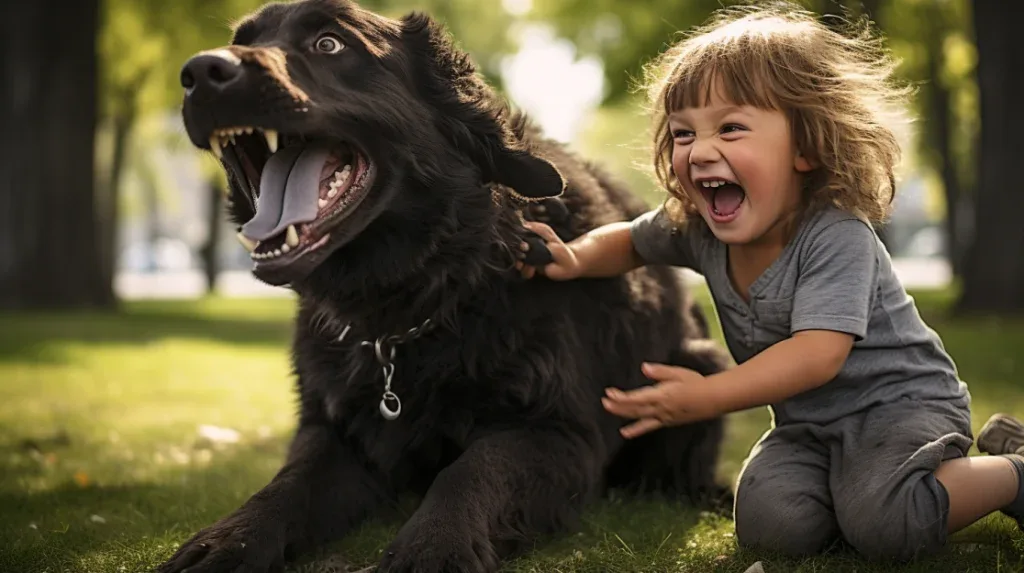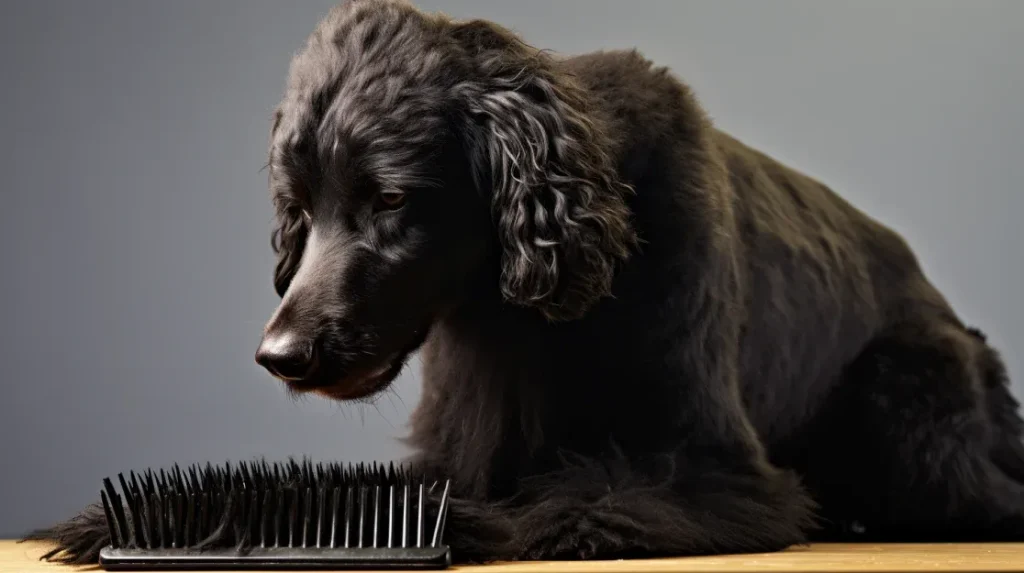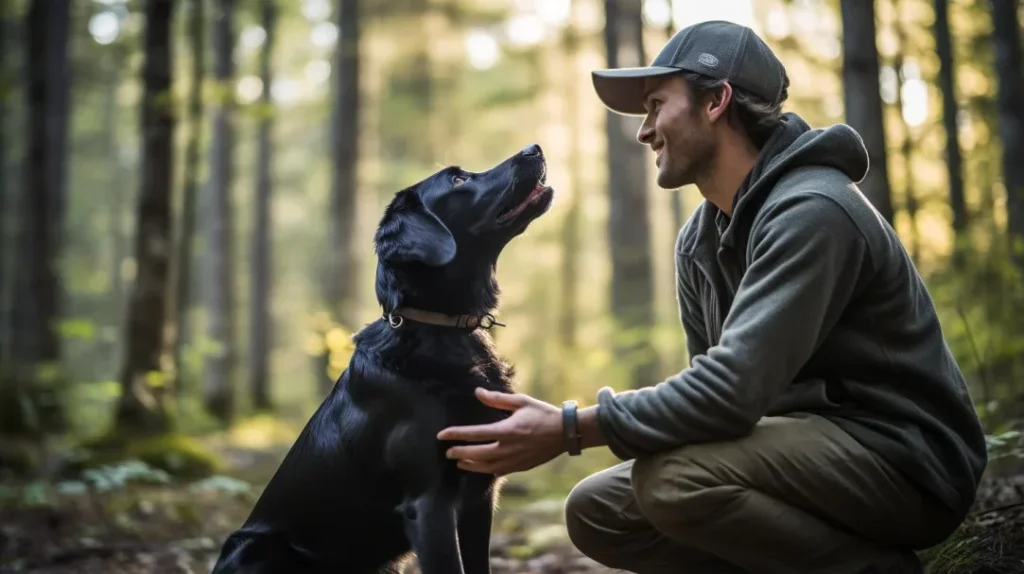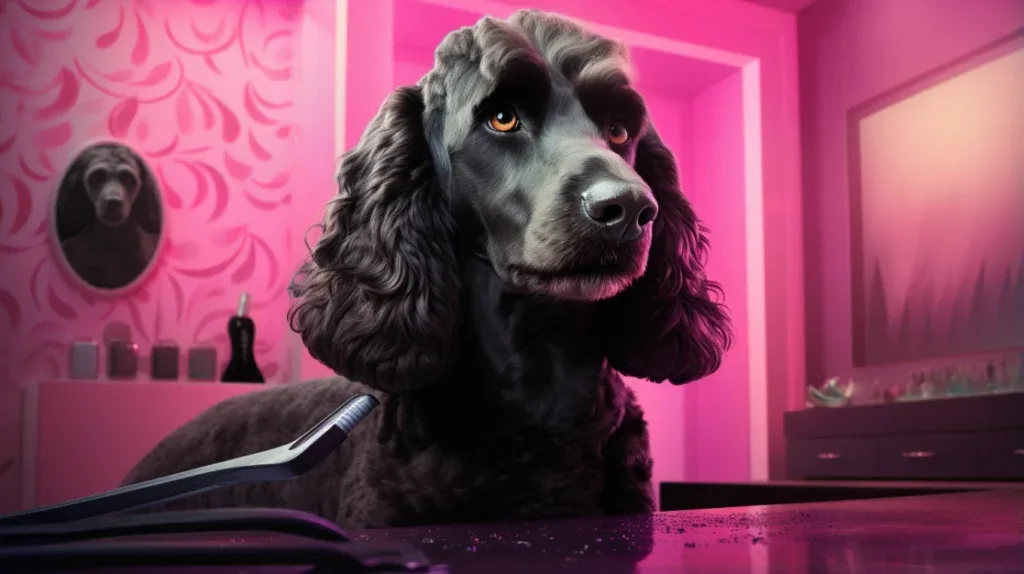Are you considering adding a furry companion to your family? If so, the curly coated retriever might be the perfect breed for you. With their friendly and energetic nature, these dogs make great companions for individuals and families.
In addition, despite their luxurious curly coats, shedding is minimal, making them a low-maintenance option for those who prefer a tidy home. But before you decide, it’s essential to understand the unique care requirements of this breed.
Key Takeaways
- Curly-coated Retrievers have a friendly and outgoing temperament, making them great companions for people and animals.
- Early socialization and positive reinforcement training methods are essential for this breed.
- Regular grooming and vet check-ups can help manage shedding and address underlying health issues.
- Curly-coated Retrievers require a consistent daily routine with regular exercise and mental stimulation to prevent boredom.
What is the Curly Coated Retriever?
The Curly Coated Retriever is known for its tight curls and unique appearance. They are medium to large, reaching up to 26 inches tall and weighing around 70-95 pounds.
Temperament-wise, Curly Retrievers are known to be intelligent, confident, and independent. They have a high energy level and require plenty of mental stimulation and physical exercise.
One of the benefits of owning a Curly Coated is their low shedding coat. Unlike other retriever breeds, their curly coat does not shed excessively, making them an excellent choice for individuals with allergies or who prefer a cleaner home. However, regular grooming is necessary to prevent matting and remove dead hair.
Taking care of a Curly Coated includes providing them with a balanced diet, regular exercise, and maintaining their overall health. Like other retrievers, they can be prone to specific health issues such as hip and elbow dysplasia, heart disease, and follicular dysplasia.
Overall, the Curly Retriever is an excellent choice for active families who can provide the necessary exercise and mental stimulation. They can make loyal and loving family pets with proper care and attention.
Temperament of the Curly Coated Retriever
The Curly Coated Retriever is known for being intelligent, confident, and independent. They are curious and highly observant, always looking for new adventures. This breed has a high energy level and thrives on mental stimulation and physical exercise. They love being included in outdoor activities such as hiking, swimming, and playing fetch.
Curly-coated are highly adaptable and easily fit into active families or individuals who lead an active lifestyle. They are loyal and affectionate towards their families, making them great pets.
While they are intelligent, they can also be stubborn sometimes, so consistent and firm training is necessary. Positive reinforcement methods work best with them. They are generally good with children and other pets if properly socialized from an early age.
Overall, the Curly Coat Retriever is a beautiful choice for those seeking a bright, energetic, and loyal companion.
Understanding the Shedding of a Curly-Coated Retriever

If you’re considering adding a Curly Coat Retriever to your family, it’s essential to understand their shedding and grooming needs. Unlike other retriever breeds, the tight curls of their coat make them unique in terms of maintenance.
One of the most significant advantages of the curly coat is that it sheds significantly less than other retriever breeds. While all dogs shed to some extent, Curly Coat Retrievers have minimal shedding due to their curly and dense fur. This means less hair on your furniture and clothes, making them an excellent choice for those who prefer a cleaner living environment.
However, their unique coat does require regular grooming to keep it in top shape. Curly-coat Retrievers can shed dead hair naturally so that you won’t find excessive shedding throughout the year. Rather than shedding, their coat will grow and eventually fall out in “molting.” You may notice small tufts of hair during this time, but it’s completely normal and natural for this breed.
To keep their coat looking its best, regular brushing is essential. Aim for at least once a week, using a slicker brush or a comb with wide teeth. This will help to prevent matting and keep their curls neat. A professional groomer can also help maintain and trim their coat when needed.
Bathing should be done only when necessary, as frequent washing can strip their coat of natural oils. However, when bathing is needed, use a gentle dog shampoo and thoroughly rinse to avoid any residue. Regular ear cleaning, nail trimming, and teeth brushing should also be part of their grooming routine.
In summary, while Curly Coat Retrievers shed less than other breeds, they require regular grooming to keep their unique coat in good condition. With proper care and attention, their crisp curls will continue to be their standout feature and a source of pride for any owner.
Essential Care Tips for Curly-Coated Retrievers

Knowing how often to groom and bathe curly-coated retrievers can help keep their coats healthy and minimize shedding. Here are three essential care tips for your curly-coated retriever:
- Regular brushing: Curly-coat retrievers have dense, tight curls that can quickly become tangled or matted. To prevent this, brush their coat at least once weekly using a slicker brush or comb. This will remove loose hair and help distribute natural oils, keeping the skin shiny and healthy.
- Proper bathing: While curly-coated retrievers don’t require frequent baths like some other breeds, giving them a good bath every 6-8 weeks is essential. Use a gentle curly dog shampoo to avoid skin irritation and rinse well.
- Training techniques: Curly-coat retrievers are intelligent dogs that respond well to positive reinforcement training methods. Consistency, patience, and rewards-based training will help you establish boundaries and teach them basic commands effectively.
In addition to these care tips, it’s crucial to be aware of common health issues that may affect your curly-coated retriever. Regular vet check-ups, proper nutrition, exercise, and a clean living environment will improve their well-being.
Training Considerations for Curly Coated Retrievers

When training curly-coat retrievers, it’s essential to establish clear boundaries and use positive reinforcement techniques.
These intelligent and energetic dogs thrive on structured training sessions that challenge their minds and bodies.
- First, set up a consistent daily routine with regular exercise and mental stimulation.
- Reward sitting and staying with goodies or praise. Avoid harsh punishments or harmful methods, damaging the dog’s trust and hindering progress.
- Focus on building a strong bond with your curly-coated retriever through consistent training sessions that are fun and engaging for both of you.
- Remember to be patient and consistent in your approach, as these loyal dogs respond best to clear expectations and positive reinforcement.
Exercise Needs of the Curly Coated Retriever
To meet their exercise needs, curly-coat retrievers should be given regular opportunities to run, play, and engage in activities that challenge them physically and mentally. This breed has a high activity level and thrives when they have ample opportunities for exercise.
Here are three activities that can help keep your curly-coat retriever happy and healthy:
- Long walks or hikes: Take your furry friend on long walks or hikes in nature, where they can explore new sights, smells, and terrain. Exercise and mental stimulation will be combined.
- Retrieving games: Curly-coat retrievers are known for their retrieving abilities. Play fetch with them using balls or frisbees to satisfy their instincts while giving them a good workout.
- Agility training: Engage your curly-coat retriever in agility training courses or set up obstacle courses at home. This will challenge them emotionally and physically and improve coordination.
Remember to tailor the intensity of these activities based on your dog’s age, health condition, and individual preferences. Regular exercise is essential to keep your curly-coated retriever happy and prevent behavior problems arising from pent-up energy.
Physical Health and Lifespan of the Curly Coated Retriever

The Curly Coated Retriever is a breed known for its physical health and longevity. With an average lifespan of 10-12 years, these dogs are generally healthy and free from significant health concerns.
One key aspect of their physical health is their curly coat, which requires regular care and grooming to keep it in optimal condition. Their tight curls help to protect them from the elements, but they do shed, especially during seasonal changes. Regular brushing with a slicker brush or wide-toothed comb is recommended to minimize shedding. Hand-stripping can also be done to remove dead hair and maintain the coat’s texture.
Regarding overall health, it’s important to note that, like all breeds, the Curly Coat Retriever can be prone to specific health conditions. Diet, exercise, and vet visits can control hip and elbow dysplasia, a common disorder. These dogs are generally healthy, but owners must check for health issues. The Curly Coated Retriever can have a long, happy life with proper care.
Their curly coat needs regular brushing to avoid matting. Slicker brushes and combs for curly hair can help keep fur tangle-free. Bathe your dog as needed with a mild shampoo for their skin type. Cleaning and trimming their ears and nails is also crucial.
Common Health Issues for a Curly Coated Retriever
When it comes to the health of a Curly Coated Retriever, there are a few common clinical issues to be aware of. One concern is elbow dysplasia, which is a condition affecting the joints. Regular vet check-ups can help monitor and manage this issue. Another common health concern is hip dysplasia, a genetic disorder that affects the hips. Early detection and proper care are essential in managing this condition.
Curly-coated Retrievers may also be prone to heart disease, so monitoring their cardiac health is crucial. Additionally, they may experience follicular dysplasia, a condition that affects the hair follicles and can lead to hair loss. Staying on top of grooming and following a proper care routine can help manage this issue. You can ensure your Curly Coated Retriever leads a happy and healthy life by being aware of these common health concerns and providing the necessary care and attention.
Frequently Asked Questions
What are the characteristics of a Curly Coated Retriever?
Curly-coated Retrievers are known for their distinctive curly coat, intelligence, and confident demeanor. They are excellent retrievers, making them great hunting and family dogs.
Where can I find Curly Coated Retriever puppies for sale?
You can find Curly Coated Retriever puppies for sale through reputable breeders, rescue organizations, and online pet adoption platforms.
What is the price range for Curly Coated Retriever puppies?
The price of Curly Coated Retriever puppies can vary based on factors like the breeder’s reputation, pedigree, and location. They can range from $1,000 to $2,500 or more on average.
Are Curly Coated Retrievers hypoallergenic due to their curly coat?
Curly Coat Retrievers are not considered hypoallergenic, as no dog breed is entirely allergy-free. However, their curly coat may produce fewer allergens and be more tolerable for some allergy sufferers.
Do Curly Coated Retrievers shed?
Curly Curly-coated retrievers shed, but their shedding is typically minimal compared to other breeds. Regular grooming can help manage their shedding.
What are the standard coat colors for Curly Coated Retrievers?
Standard coat colors for Curly Coat Retrievers include black and liver (chocolate). These are the only recognized colors for the breed.
How would you describe the temperament of Curly Coated Retrievers?
Curly-coated Retrievers are known for their confident, independent, and intelligent temperament. They are loyal and affectionate and make excellent companions for active families.
Can you tell me about the Murray River Curly Coated Retriever?
The Murray River Curly Coated Retriever is a variety of Curly Coat Retriever that originated in Australia. They share similar characteristics with the standard breed but are specifically bred for hunting in waterfowl-rich areas along the Murray River.
Where can I adopt a Curly Coated Retriever?
You can adopt a Curly Coated Retriever from rescue organizations or breed-specific rescues dedicated to the breed. Check local shelters and rescue websites for availability.
Are there any specific grooming needs for Curly Coated Retrievers?
Curly-coat Retrievers require regular grooming to maintain their curly coat, prevent matting, and minimize shedding. Their grooming needs include brushing, occasional trimming, and attention to their ears and eyes.
Conclusion
After delving into the temperament, shedding, care tips, training considerations, exercise needs, and health and grooming tips for the Curly Coated Retriever, you probably wonder if this breed is right for you.
Well, let me tell you something with a touch of satire. If you enjoy spending hours cleaning up hairballs that magically appear in every nook and cranny of your home, then yes, the Curly Coated Retriever is the dog for you!
But in all seriousness, this intelligent and energetic breed can make an excellent companion with proper training and care. Just be prepared for some extra vacuuming sessions!
Quick Paw Note: While we’re passionate about providing helpful pet nutrition content, it’s essential to remember that this info isn’t a substitute for professional veterinary advice. Always consult your vet for your pup’s specific dietary needs. We strive for accuracy, but paw-lease note that we can’t guarantee the complete reliability of all content. Stay pawsome! 🐾




